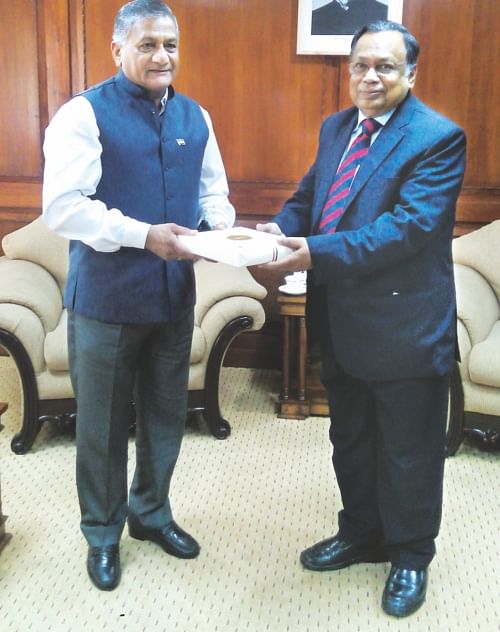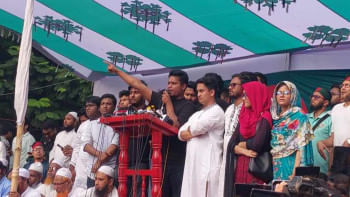Modi govt renews pledge to deepen trade links with Saarc

The Modi government is committed to strengthening relations with Saarc countries, including Bangladesh, for greater regional cooperation and connectivity, a visiting Indian state minister said yesterday.
“Our prime minister has invited the Saarc countries to his swearing-in ceremony to convey our friendly intentions and the way we want to engage with them ahead,” said VK Singh, India's union minister of state for development of northeastern region.
“Today we have the climate and the political will on either side of the border to think and progress in a manner which will be of benefit to both sides. If there is no mutual benefit, we will not move forward.”
Singh's comments came at the India-Bangladesh business conclave, jointly organised by the Indian Chamber of Commerce and the India-Bangladesh Chamber of Commerce and Industry at the capital's Sonargaon Hotel.
He also suggested the two neighbouring countries to collaborate in the garment sector to generate more economic activities.
“I am quite sure that if the strengths of raw materials, technology and market availability of both the countries are combined, we can be the foremost player in the textile industry. No-one can beat us.”
Singh, also the minister of state for external affairs, said although India has given duty- and quota-free access to Bangladeshi items, the country's exporters are not fully exploiting the facilities.
“Probably, the Bangladeshi business community does not have adequate understanding of the Indian market,” he said, while urging the business communities of both sides to come up with specific suggestions to rectify the situation.
Speaking at the inaugural session of the daylong programme, Mashiur Rahman, economic affairs adviser to Prime Minister Sheikh Hasina, stressed the need to indentify the setbacks first to implement the agreements on bilateral and regional issues.
“We should be able to tell India that we do not like this, while India should be able to tell us that they do not like this. Unless we can reach that level of understanding, the agreements signed will remain on conventional documents.”
A close relationship based on confidence is the key to strengthening relationship between the regional countries, Rahman said, while calling for multimodal transport routes to get economic benefits from regional connectivity.
“We have a transit agreement and transhipments take place on an ad-hoc basis. We need a multimodal transit system and we need to institutionalise it.”
Rahman particularly stressed setting up warehouses at ports and adequate infrastructure to harness the benefits of regional transit.
He also requested the Indian government to remove tariff and non-tariff barriers at land customs, as they are hurting trade and commerce between the two countries.
At present, about 14 percent of the country's total imports and 8.8 percent of global trade is with India, according to Kazi Akram Uddin Ahmed, president of the Federation of Bangladesh Chambers of Commerce and Industry.
Indian High Commissioner Pankaj Saran said the new government of India is “firmly and totally” committed towards a better relationship with Bangladesh.
He urged Bangladesh to hold roadshows in India and send business delegations to attract investment.
“I think it is important that the Bangladeshi chambers and investors and the Board of Investment travel to the different metropolitan cities and business centres of India to showcase the opportunities that Bangladesh has for Indian investors.”
A large number of Indian companies are looking at Bangladesh for investment and business expansion, according to Saran.
“Only through investment and setting up manufacturing units in Bangladesh that we can generate jobs and value-addition and exports back to India and other countries. And this way, we can help Bangladesh increase its exports to India.”
Tripura Commerce and Industry Minister Tapan Chakraborty said the state shares an 856km-long international border with Bangladesh, most of which is in the non-mountainous areas.
The state's location and socioeconomic linkages with Bangladesh make it a potential hub for trade with and through Bangladesh for the entire northeastern region of India, he said.
For promotion of trade and investment in the South Asian region, Chakraborty urged the Bangladesh government to consider seven points which include full operationalisation of Ashuganj port for multimodal connectivity, allowing use of Chittagong port for Indian goods and strengthening land custom stations on Bangladesh side.
Meghalaya Chief Minister Mukul Sangma said the 443 km-long border with Bangladesh is reason enough to explore business opportunities in Meghalaya. “It is not only from the perspective of trade and commerce but also from a geo-political angle.” Bangladesh can take advantages agro-forest resources of the north-eastern states including the natural resource-rich Meghalaya.
He also proposed joint ventures particularly in the field of electricity along the Indo-Bangla border, as the states have rich deposits of hydro power, granite and limestone.
Meanwhile, Singh also called on Foreign Minister AH Mahmood Ali at the ministry, during which issues pertaining to connectivity and trade were discussed.

 For all latest news, follow The Daily Star's Google News channel.
For all latest news, follow The Daily Star's Google News channel. 



Comments